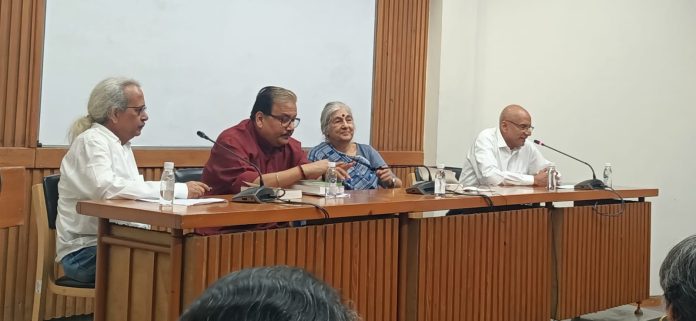New Delhi, Aug 30: Senior journalist Ajaz Ashraf’s book, Bhima Koregaon: Challenging the Caste, was launched at India International Centre last evening. The book, published by Paranjoy Guha Thakurta, delves into the enduring struggle against casteism, focusing on the events surrounding the Bhima Koregaon incident and its broader implications.
During the book’s introduction, Ashraf described Challenging Caste as an exploration of the violence at Bhima Koregaon, portraying it as a confrontation between two conflicting worldviews – one seeking to dismantle social hierarchies and the other intent on preserving them. The book provides a deep analysis of the songs and performances at the Elgar Parishad event, which controversially critiqued Brahminism and Prime Minister Narendra Modi. It also brings to light archival evidence suggesting that Govind Gopal, a Mahar, rather than the Maratha couple Bapuji Buva and Padmavati, was associated with the cremation of Chhatrapati Sambhaji. The book further examines the influence of James Laine’s controversial book on Maharashtra’s anti-Brahmin consciousness and vividly recounts the events of January 1, 2018, when Bhima Koregaon became a flashpoint.
Ashraf also challenges the narrative propagated by Pune police and National Investigating Agency (NIA), which blamed the violence on a supposed Maoist conspiracy involving 16 anti-caste, civil rights activists, intellectuals, and lawyers. According to Ashraf, the book dissects the flaws in this narrative and exposes weaknesses in the evidence allegedly planted on the accused’s hacked computers. He argues that the conspiracy against the sixteen not only brought immense suffering to their families but also highlighted inherent inequalities in India’s social order, which undermines the democratic process.
Senior Supreme Court lawyer Colin Gonsalves, speaking at the event, criticised the judiciary’s handling of Bhima Koregaon cases, calling it a betrayal comparable to judiciary’s actions during the Emergency. However, Gonsalves noted a shift in the Supreme Court’s attitude, with some judges now recognising the injustices inflicted on leading activists and lawyers.
Former MP Subhashini Ali participated in the panel discussion, emphasising the pervasive hatred that the Brahminical class harbours not only towards Muslims and Dalits but also towards intermediary castes.
MP Manoj Jha, who had earlier released the book in Parliament, discussed the importance of preserving and transferring memories across generations. He highlighted how subaltern communities, like the Dalits in India, often struggle to retain and pass on their memories, a challenge that has historically been faced by oppressed groups worldwide.




